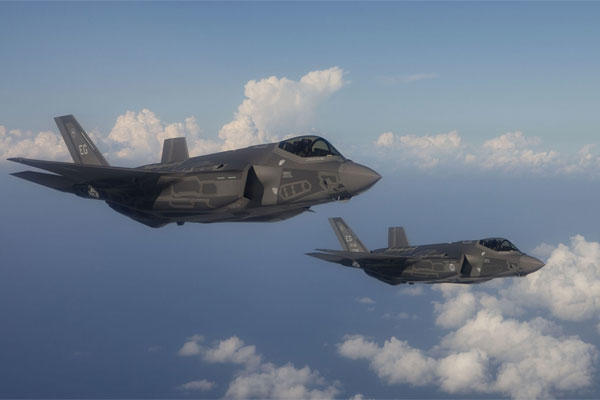President Obama's Camp David summit with the Gulf Arab states on Thursday will seek to boost arms sales to the Gulf neighbors but the F-35 Joint Strike Fighter has been taken off their wish list.
White House officials on Monday sought to tamp down speculation that King Salman of Saudi Arabia canceled his attendance at Camp David when the U.S. made clear that his country would not be permitted to buy F-35s.
"We do not and never anticipated this to be a summit that only focused on one capability, like the F-35, for instance," said Ben Rhodes, the deputy National Security Advisor to Obama.
"What we're focused on is the capabilities that are most relevant to the current security challenges that the GCC (Gulf Cooperation Council) faces," Rhodes said in a conference call with other administration officials.
"So, I think it would be a mistake to say that there was some list of very finite capabilities that were the only things on the table here," Rhodes said, but discussions will continue on the Gulf states' security needs.
Saudi Foreign Minsiter Adel al-Jubeir also denied that the F-35 or U.S. policy on Iran were factors in King Salman's absence.
"This is not related in any way, shape or form to any disagreement between the two countries," al-Jubeir said. "I think this idea that this is a snub because the king did not attend is really off base."
Rhodes said that the security of the Gulf states was a "core interest" of the U.S., and "we are prepared to use all elements of our power to back up our commitment to that core interest."
At Camp David, "there will be a discussion of a range of capabilities with respect to ballistic missile defense, with respect to cyber capabilities, with respect to countering terrorism, and the types of asymmetric threats that countries in the region are facing," Rhodes said.
On the F-35s, Robert Malley, the National Security Council's Mideast coordinator, said the summit was never meant to present the Gulf states with a check list on weapons.
"I think they understood this is not a case of the GCC countries coming with a shopping list and we'd have to tick off those of the items that they wanted that we would agree on," Malley said.
Colin Kahl, the National Security Advisor to Vice President Joe Biden, noted that the U.S. has already sold vast amounts of advanced weaponry to the Gulf states, and the sale of F-35s at this time should not be a drawback.
"This administration has worked extraordinarily closely with the Gulf states to make sure that they had access to state-of-the-art armaments," Kahl said.
The F-35 might not be on the table, "but keep in mind under this administration we moved forward on a package for the Saudis that will provide them the most advanced F-15 aircraft in the region," Kahl said.
"The Emiratis fly the most advanced F-16s in the world. They're more advanced than the ones our Air Force flies. Taken as a whole, the GCC last year spent nearly $135 billion on their defense. The Saudis spent more than $80 billion. Taken in comparison, the Iranians spent something like $15 billion on their defense," Kahl said.
-- Richard Sisk can be reached at Richard.Sisk@military.com





























